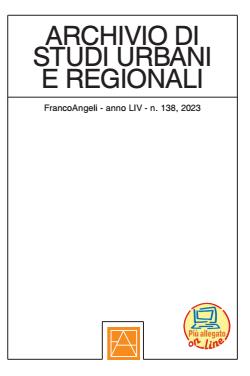Fascicolo 143/2025
- Domenico Patassini, Ada Becchi: keynesiana eccentrica per cultura economica e sensibilità territoriale
- Federico Marchesi , Marco Mareggi, La logistica piacentina diffusa. Indagine sulle esternalità di un settore in esplosione
- Enrico Gottero, Agro-urbanistica. Una nuova lente per interpretare e pianificare le aree agricole1
- Remi Wacogne, Roberto Paladini, Tra supporto alle PMI e tutela del patrimonio culturale: politiche per l’artigianato a confronto tra Normandia e Veneto
- Davide Gualerzi, Davide Lunardon, The territorial explanation of populism: the Veneto region and the Bassano area (La spiegazione territoriale del populismo: la regione Veneto e l’area di Bassano)
Dibattito
- Guido Borelli, Il corpo e i ritmi dentro e fuori al Labirinto. Cinquant’anni dopo La Production de l’espace1
- Francesco Biagi, “Svolta spaziale” e “Produzione dello spazio”. Perché Lefebvre non è “postmoderno”?
- Rolando Espinosa Hernández, La produzione dello spazio come storia dell’urbano
- Olga Tzatzadaki, Henri Lefebvre e lo spazio della letteratura: le rappresentazioni della vita quotidiana del “modern everyman” nell’Ulisse di James Joyce
